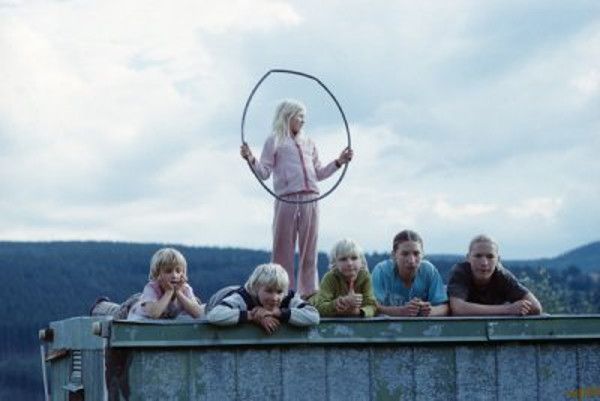Eye For Film >> Movies >> Always Together (2014) Film Review
Always Together
Reviewed by: Amber Wilkinson

Sometimes you have to admit you were wrong. When I was critical of the far-fetched set-up of Captain Fantastic at Sundance, which sees a family living off the grid under the watchful eye of a counter-culture patriarch, I didn't imagine that less than a year later I would be watching a documentary featuring a family on whom that movie could partially be based. Although, inevitably, the reality of life in the Mlcoch household is much more complex than Matt Ross's film imagines.
Petr and Simona are rearing nine children, from around age three to late teens in there ramshackle homestead in Šumava in southern Bohemia. They don't have much money - as evidenced by a trip at the start of the film to a Czech employment office - but they work as a collective, sharing the chores. It's a Bohemian lifestyle to the full, with the youngest children often seen scurrying up trees to worryingly high altitudes without their dad batting an eye-lid.

There's unstructured but seemingly thorough home schooling from Simona and, in many respects, the kids seem perfectly happy. They're also talented. The two oldest boys make guitars and play flamenco music on them in perfect synch, often to raise cash for the family, while one of the youngest, being tested on her maths skills in a school room, shows she's learnt plenty with the help of her mum.
In every idyll, however, there is a 'but' and, in this case, it's the ever-present Petr, who has some very precise views of what it means to be a father - or as he terms it "author" of his family. It's not just that he packs all but one of them off in a camper van to live in the shadow of a motorway bridge in Spain - a move, which like much of the film is observed by director Eva Tomanová without any explanation. He also seems to be omnipresent elsewhere, such as when one of his sons declares "I've always been happy," while being unable to go into detail and looking apprehensively at his dad. Equally, when one of his youngest girls is quizzed about whether she has ever received a present, seems unable to answer and keeps glancing at him as if for confirmation.
Beyond that, there are frequent references to corporal punishment. Although we never see Petr do more than lightly cuff one of his children over the head, he often mentions smacking and the fact that it has an immediate effect on them speaks volumes.
Tomanová, making her debut here, shows rather than tells their story, leaving us to interpret whether the girl's school testing is related to the family packing up and heading to Spain is a bid to avoid state intervention or merely just part of an annual pilgrimage to escape the worst of the cold. She let's the children's wariness of their father speak for itself, a hands-off approach that is sometimes frustrating as we wonder what, if any, part social workers or the state are involved with the family. As the film ends, there is a suggestion that "always" may not be forever at least for some of the clan, a development that most will view as optimistic.
Reviewed on: 17 Nov 2016
















